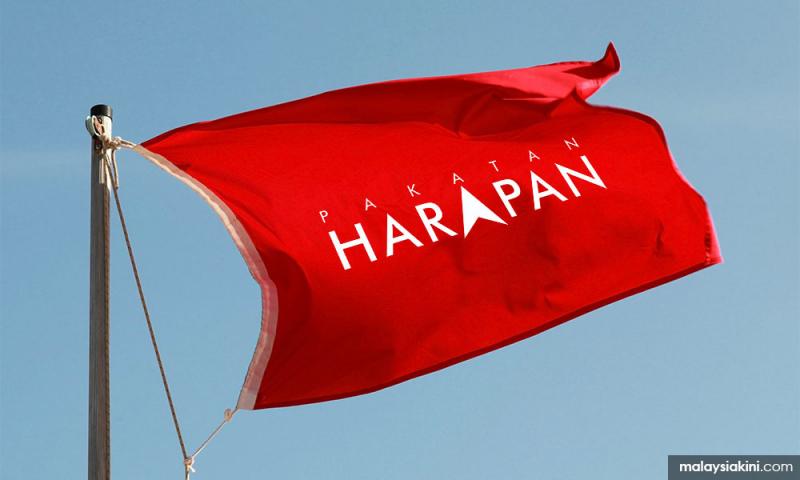
Wong Chin Huat
COMMENT | I have written in the past few days against the idea of a “big tent” to include Perikatan Nasional (PN) and also Pakatan Harapan’s addiction to incumbent advantages and anger mobilisation.
Expectedly, friends and critics question how Harapan can survive in GE15 abandoning the outdated dream of the “Two-Coalition System” and anger mobilisation.
Some think I cook out my analyses in an air-conditioned room or simply copy-and-paste foreign models, similar responses I got when I first advocated for Confidence-and-Supply Agreements (CSAs) as a solution to the political impasse starting in July 2020.
Here are my suggestions on how Harapan (which should include Muda) can and should position itself for GE15, following the logic espoused in my critiques.
Suggestion 1: Aim for 40pct of seats, not a simple majority
For the past 32 years, opposition leaders and supporters have been indoctrinated that to do well, all opposition parties must form a united front that aspires to win a simple majority.
Modelled on the Anglo-American two-party system, the idea goes, most voters won’t support permanent opposition. The post-Sheraton realities complicate this thinking in two ways.
Firstly and negatively, with unreconciled differences between Harapan and PN on Islamisation and bumiputeraism, another marriage of convenience may backfire, causing them to lose votes to BN or Parti Aku Tak Undi (PATU), the largest party in town.
COMMENT | I have written in the past few days against the idea of a “big tent” to include Perikatan Nasional (PN) and also Pakatan Harapan’s addiction to incumbent advantages and anger mobilisation.
Expectedly, friends and critics question how Harapan can survive in GE15 abandoning the outdated dream of the “Two-Coalition System” and anger mobilisation.
Some think I cook out my analyses in an air-conditioned room or simply copy-and-paste foreign models, similar responses I got when I first advocated for Confidence-and-Supply Agreements (CSAs) as a solution to the political impasse starting in July 2020.
Here are my suggestions on how Harapan (which should include Muda) can and should position itself for GE15, following the logic espoused in my critiques.
Suggestion 1: Aim for 40pct of seats, not a simple majority
For the past 32 years, opposition leaders and supporters have been indoctrinated that to do well, all opposition parties must form a united front that aspires to win a simple majority.
Modelled on the Anglo-American two-party system, the idea goes, most voters won’t support permanent opposition. The post-Sheraton realities complicate this thinking in two ways.
Firstly and negatively, with unreconciled differences between Harapan and PN on Islamisation and bumiputeraism, another marriage of convenience may backfire, causing them to lose votes to BN or Parti Aku Tak Undi (PATU), the largest party in town.
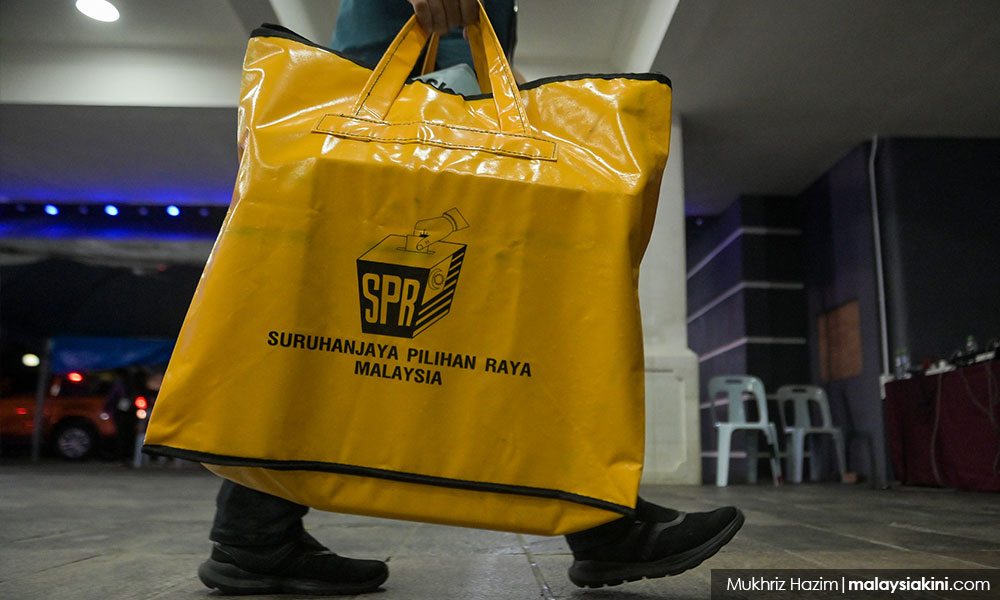
Secondly, and positively, simple-majority governments are now replaced by post-election coalition governments, so a party or coalition wins power without winning a simple majority.
Between the state elections of Sabah (September 2020) and Malacca (November 2021), Umno was only hoping to win at least 70-80 seats to dominate a simple majority post-election coalition government of around 120-130 seats.
After Malacca and Johor, Umno now wants to restore its pre-2018, or even, pre-2008 dominance.
Already in Johor, Umno wants a two-third majority for BN so that it can increase seats in the State Legislative Assembly (DUN) to cause delimitation.
Umno wants the same at the federal level - beyond a simple majority (112 seats) on its own and a two-thirds majority (148 seats) with GPS (maximum 31 seats) to increase parliamentary seats to expedite constituency redelineation.
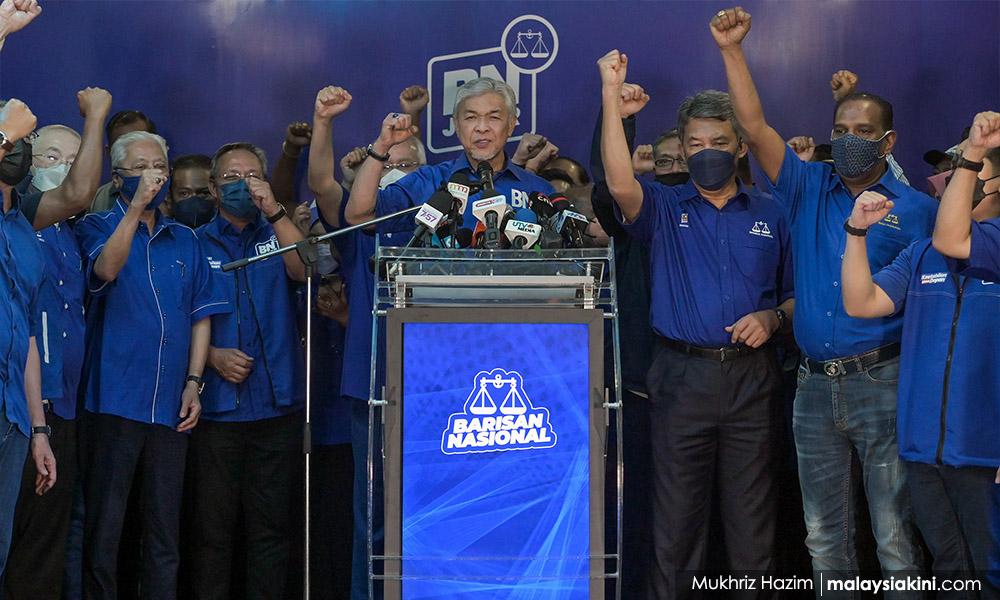
After a strong win in the Johor polls, Umno seems to be aiming for a two-thirds majority in Parliament as well
Without a seat increase, redelineation can only start earliest by 2026 in Peninsular Malaysia, 2025 in Sabah and 2023 in Sarawak, and may not be in time for GE16.
How can Harapan mobilise voters to stop Umno’s dream of two-third majority dominance?
Assembling a Harapan+PN marriage of convenience will only send voters to BN or PATU. Aiming for a simple majority on its own would sound incredible to middle-ground voters, and useful for Umno and PN to whip up anti-Harapan fear amongst many Malay-Muslims.
Retreating to the 2008 position - denying BN’s two-third ambition - would demoralise its base as if 14 years in life have been wasted.
Harapan’s best bet is to aim for 40 percent (89) of seats, incidentally what it won in 2013, to position itself as a potential senior partner in the next post-election coalition government, or a formidable and effective opposition checking a government with not more than 60 percent majority. It has three advantages.
First, its supporters would know abstention is weakening Harapan’s chance and bargaining power to be in the next government, the cost is real.
In contrast, if Harapan’s aim is a simple majority, unachievable no matter how high the turnout amongst its supporters, there is no real cost for its supporters who stay back at home.
Without a seat increase, redelineation can only start earliest by 2026 in Peninsular Malaysia, 2025 in Sabah and 2023 in Sarawak, and may not be in time for GE16.
How can Harapan mobilise voters to stop Umno’s dream of two-third majority dominance?
Assembling a Harapan+PN marriage of convenience will only send voters to BN or PATU. Aiming for a simple majority on its own would sound incredible to middle-ground voters, and useful for Umno and PN to whip up anti-Harapan fear amongst many Malay-Muslims.
Retreating to the 2008 position - denying BN’s two-third ambition - would demoralise its base as if 14 years in life have been wasted.
Harapan’s best bet is to aim for 40 percent (89) of seats, incidentally what it won in 2013, to position itself as a potential senior partner in the next post-election coalition government, or a formidable and effective opposition checking a government with not more than 60 percent majority. It has three advantages.
First, its supporters would know abstention is weakening Harapan’s chance and bargaining power to be in the next government, the cost is real.
In contrast, if Harapan’s aim is a simple majority, unachievable no matter how high the turnout amongst its supporters, there is no real cost for its supporters who stay back at home.
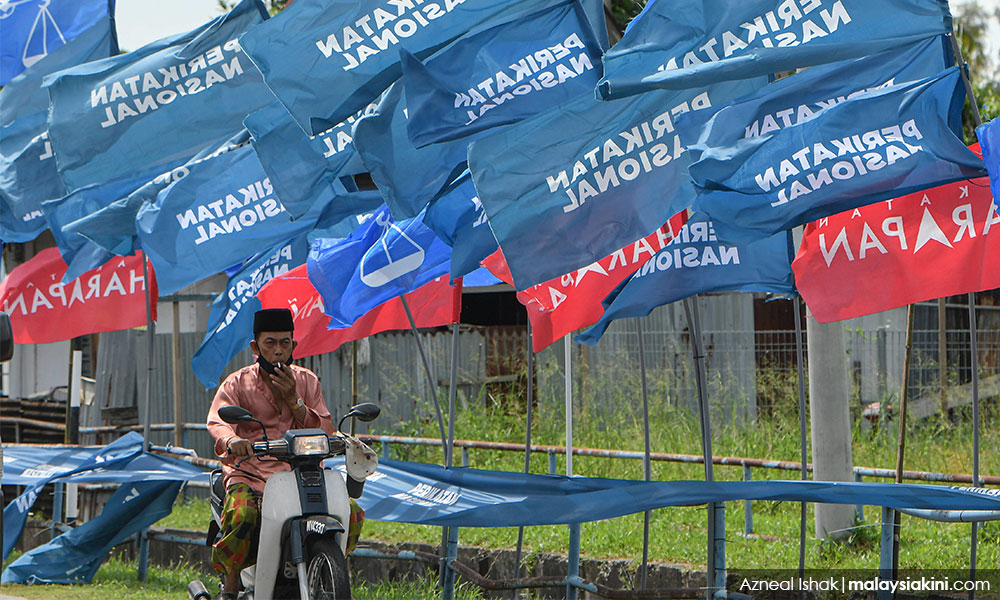
BN, Perikatan Nasional, and Pakatan Harapan flags seen during the Malacca polls
Second, by committing to a post-election coalition government, Harapan can alleviate the Malay-Muslims’ fear that a victorious Harapan would be too aggressive and dangerous. It can be checked by BN, PN or GPS. This is more effective than asking the better performing DAP to stay low-key so as not to overshadow PKR and Amanah.
Third, Harapan does not have to contest in all 222 seats. Strategic coordination with PN, GPS and other blocs may be negotiated to have straight fights with BN in certain constituencies and multi-corners in others. Resources and time can be better spent.
Suggestion 2: Mobilise voters on crisis, not anger
Elections are won more on emotions than rational calculations. Hence, anger mobilisation is so tempting and addictive to the opposition, especially when they don’t expect to win and govern.
In contrast, every government must make compromises. This reduces their ability to whip up anger, which requires a more black-and-white understanding of realities. While some desperate governments still mobilise on anger, they risk tearing their country apart and often don’t last.
One handicap for Harapan in anger mobilisation is exactly this: unlike previous opposition coalitions, it had been in power. It had been tested and it failed on some issues that it used to attack BN - from cancelling highway tolls to recognising UEC.
More detrimental to Harapan’s anger mobilisation is post-Sheraton political fatigue. People are too tired to be angry. Try agitating and they will simply walk away from you. That’s the secret of PATU’s success.
What then to replace anger - past orientated in PH’s case - as the emotional mobiliser for PH? Crisis.
Second, by committing to a post-election coalition government, Harapan can alleviate the Malay-Muslims’ fear that a victorious Harapan would be too aggressive and dangerous. It can be checked by BN, PN or GPS. This is more effective than asking the better performing DAP to stay low-key so as not to overshadow PKR and Amanah.
Third, Harapan does not have to contest in all 222 seats. Strategic coordination with PN, GPS and other blocs may be negotiated to have straight fights with BN in certain constituencies and multi-corners in others. Resources and time can be better spent.
Suggestion 2: Mobilise voters on crisis, not anger
Elections are won more on emotions than rational calculations. Hence, anger mobilisation is so tempting and addictive to the opposition, especially when they don’t expect to win and govern.
In contrast, every government must make compromises. This reduces their ability to whip up anger, which requires a more black-and-white understanding of realities. While some desperate governments still mobilise on anger, they risk tearing their country apart and often don’t last.
One handicap for Harapan in anger mobilisation is exactly this: unlike previous opposition coalitions, it had been in power. It had been tested and it failed on some issues that it used to attack BN - from cancelling highway tolls to recognising UEC.
More detrimental to Harapan’s anger mobilisation is post-Sheraton political fatigue. People are too tired to be angry. Try agitating and they will simply walk away from you. That’s the secret of PATU’s success.
What then to replace anger - past orientated in PH’s case - as the emotional mobiliser for PH? Crisis.
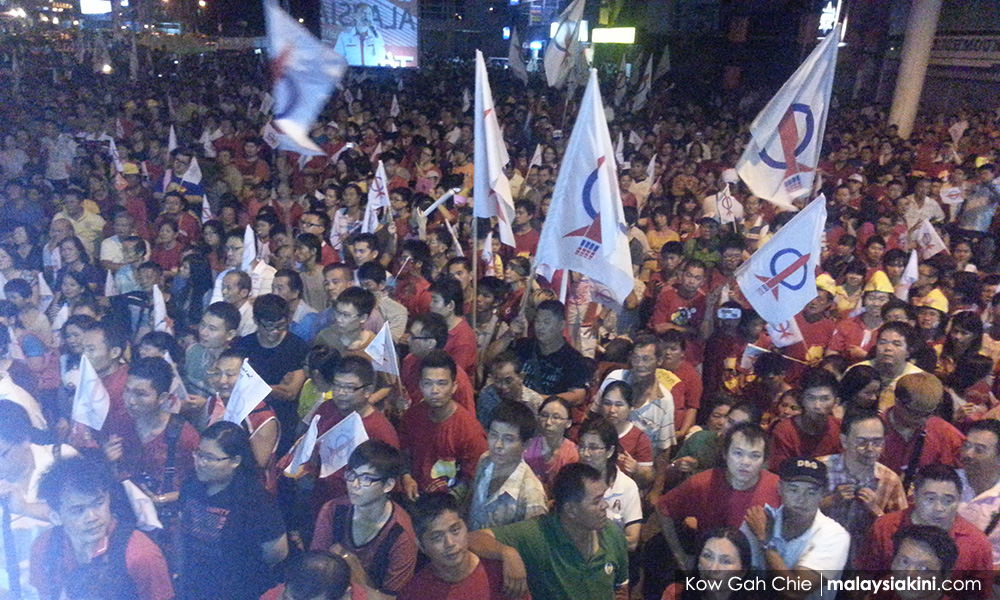
DAP supporters waving flags during a ceramah in Sibu, 2013
People are never too tired to fear and worry for their future. Political machinations aside, we have had the Covid-19 pandemic; the floods caused by climate change, deforestation and poor town planning; and now the Russia-Ukraine War that disrupts supplies and raises prices.
If Harapan can offer credible solutions and communicate them effectively to the public, it can attract supporters of PATU, even BN and Harapan, when the next crisis strikes.
But policy solutions are not press statements or ceramah speeches. An exciting and realistic manifesto cannot be cooked out two weeks before the election.
In Johor, Harapan’s manifesto was the only one - unlike those of Pejuang, PN, BN and Muda - which had not a single mention of floods, climate change or even the environment.
Doesn’t Harapan always parade its ex-environment minister Yeo Bee Yin as one of its best talents to govern Malaysia? Why put her grey matter to waste?
People are never too tired to fear and worry for their future. Political machinations aside, we have had the Covid-19 pandemic; the floods caused by climate change, deforestation and poor town planning; and now the Russia-Ukraine War that disrupts supplies and raises prices.
If Harapan can offer credible solutions and communicate them effectively to the public, it can attract supporters of PATU, even BN and Harapan, when the next crisis strikes.
But policy solutions are not press statements or ceramah speeches. An exciting and realistic manifesto cannot be cooked out two weeks before the election.
In Johor, Harapan’s manifesto was the only one - unlike those of Pejuang, PN, BN and Muda - which had not a single mention of floods, climate change or even the environment.
Doesn’t Harapan always parade its ex-environment minister Yeo Bee Yin as one of its best talents to govern Malaysia? Why put her grey matter to waste?
kt comments: Surprisingly Bee Yin is not even in the DAP CEC
Here, Harapan needs to address its cynical attitude on manifestos and policy-based competition, not only openly espoused by former prime minister Dr Mahathir Mohamad but also privately shared by many of its leaders and supporters.
It is true that normal citizens don’t read manifestos to make up their minds to vote. But they do respond to parties’ messaging, gestures and actions in and even before election campaigns.
A real manifesto is not an election leaflet, but a plan that directs the party on issues during and between elections.
Instead of assigning backend technocrats to draft a nice decorative document, senior politicians must weigh the benefits, costs and feasibility of policy proposals, like ministers do in cabinet meetings, to produce a politically viable and attractive manifesto.
Will Harapan get serious on GE15 manifesto?
Umno may have GE15 as early as mid-September, if Parliament is dissolved immediately after the MOU expires on July 31.
Besides the commendable strategy of not having state elections for Harapan’s three states (Selangor, Penang and Negeri Sembilan), likewise, for PN-PAS’ Kelantan, Terengganu and Kedah, Harapan must develop its new playbook to adapt to new realities post-Sheraton.
Harapan does not need to listen to this armchair analyst. Just listen to PATU supporters. Chat with them.
Don’t dismiss or talk down to them condescendingly. If Harapan can steal votes from PATU, it stands a chance to also steal some from BN and PN. On the other hand, if it tries only to steal votes from BN and PN, it may gain little from either and none from PATU.
WONG CHIN HUAT is an Essex-trained political scientist working on political institutions and group conflicts. Mindful of humans' self-interest motivation while pursuing a better world, he is a principled opportunist.

No comments:
Post a Comment